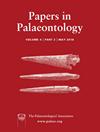来自哈默施米德人类居住地的原始大熊猫 Kretzoiarctos beatrix(食肉目,熊科):饮食影响
IF 2.3
2区 地球科学
Q1 PALEONTOLOGY
引用次数: 0
摘要
现存大熊猫是食肉目动物中食草性最强的种类之一,主要以坚硬的植物材料为食。大熊猫进化过程中的最初阶段对我们了解形成这一特殊生态位的因素具有特别重要的意义。本研究涉及从德国 Hammerschmiede 晚中新世地区新发现的原始黑齿兽熊 Kretzoiarctos beatrix 的牙齿材料。这是 Kretzoiarctos 属在伊比利亚半岛以外的首次报道,将其空间范围扩大到了中欧。西班牙和德国目前已知的所有 K. beatrix 分布地点的年龄都非常相似(约 11.9-11.4 Ma)。目前的材料具有明显的特征,可以在分类学上将其与欧洲的其他中新世乌希德龙(如 Ballusia、Ursavus、Miomaci、Agriarctos 和 Indarctos)区分开来。对所有这些形式进行了全面的比较。新的标本被用于牙齿微磨纹理分析,并结合形态学比较,以研究这种原始兽脚类的饮食习惯。研究结果表明,Kretzoiarctos不像现生大熊猫那样以坚韧的植物为食,而是更类似于现生的Tremarctos,表现出偶尔吃肉的机会主义行为。本文章由计算机程序翻译,如有差异,请以英文原文为准。
The primitive giant panda Kretzoiarctos beatrix (Carnivora, Ursidae) from the hominid locality of Hammerschmiede: dietary implications
Extant giant pandas are among the most herbivorous forms of the order Carnivora, feeding mainly on hard plant material. The first steps of their evolutionary lineage are of particular interest for our understanding of the factors that led to this specialized niche. The present work deals with newly discovered dental material of the primitive ailuropodine bear Kretzoiarctos beatrix from the Late Miocene locality of Hammerschmiede (Germany). This is the first report of the genus Kretzoiarctos outside the Iberian Peninsula, expanding its spatial range to Central Europe. All of the currently known localities with K. beatrix , from both Spain and Germany, are very similar in age (c . 11.9–11.4 Ma). The present material has distinct features that enable its taxonomic discrimination from other Miocene ursids of Europe, such as Ballusia , Ursavus , Miomaci , Agriarctos and Indarctos . A thorough comparison is conducted of all of these forms. The new specimens were used in a dental microwear texture analysis in combination with ecomorphological comparisons, to investigate the dietary habits of this primitive ailuropodine. The results suggest that Kretzoiarctos was not an eater of tough plant material like the extant giant panda but was more similar to the extant Tremarctos , exhibiting opportunistic behaviour with occasional consumption of meat.
求助全文
通过发布文献求助,成功后即可免费获取论文全文。
去求助
来源期刊

Papers in Palaeontology
PALEONTOLOGY-
CiteScore
4.50
自引率
4.30%
发文量
55
期刊介绍:
Papers in Palaeontology is the successor to Special Papers in Palaeontology and a journal of the Palaeontological Association (www.palass.org). The journal is devoted to the publication of papers that document the diversity of past life and its distribution in time and space.
Papers in Palaeontology is devoted to the publication of papers that document the diversity of past life and its distribution in time and space. As a sister publication to Palaeontology its focus is on descriptive research, including the descriptions of new taxa, systematic revisions of higher taxa, detailed biostratigraphical and biogeographical documentation, and descriptions of floras and faunas from specific localities or regions. Most contributions are expected to be less than 30 pp long but longer contributions will be considered if the material merits it, including single topic parts.
The journal publishes a wide variety of papers on palaeontological topics covering:
palaeozoology,
palaeobotany,
systematic studies,
palaeoecology,
micropalaeontology,
palaeobiogeography,
functional morphology,
stratigraphy,
taxonomy,
taphonomy,
palaeoenvironmental reconstruction,
palaeoclimate analysis,
biomineralization studies.
 求助内容:
求助内容: 应助结果提醒方式:
应助结果提醒方式:


